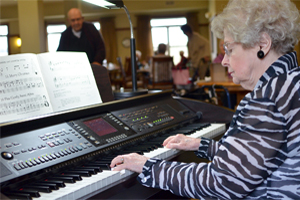Dementia affects millions of people worldwide. As the global population ages, understanding the common risk factors for dementia becomes increasingly important.
Age: Age is the strongest risk factor for dementia. After the age of 65, the risk of developing dementia, including vascular dementia and other forms, increases significantly. Starting at 65, a person’s risk of dementia approximately doubles every five years. While it is uncommon for individuals to develop dementia before 65, those who do are diagnosed with young-onset dementia.
Family History: Having a family history of dementia can increase your risk of developing the disease, although many people with a family history do not develop symptoms. Certain genetic mutations are associated with different types of dementia, further elevating the risk for those with a familial tendency.
Cardiovascular Health: Poor cardiovascular health can impact brain health. These include obesity, high cholesterol, high blood pressure and atherosclerosis. Maintaining a healthy heart through diet and exercise can reduce the risk of dementia.
Mental Health: Mental health conditions like anxiety and depression are linked to an increased risk of dementia, although the mechanisms are not yet fully understood. Chronic stress is a notable risk factor, as stressful experiences can accelerate brain aging. This may partly explain why African Americans, who often face higher levels of stress, have higher rates of dementia.
Lifestyle Factors: Certain lifestyle choices can increase the risk of developing dementia. Smoking, excessive alcohol consumption, and an unhealthy diet contribute to cognitive decline. For example, smokers who quit for a period of time may benefit from a reduced risk of dementia. Adopting healthier habits can have a significant positive impact on brain health.
Social Isolation: Social isolation is a significant risk factor for dementia, potentially increasing the risk by about 60%. Maintaining strong social connections and participating in activities can support mental health. Strong family and friend connections are crucial to combat loneliness and promote cognitive well-being.
Dementia affects millions of people worldwide, making it essential to understand its risk factors and take steps to reduce them. Adopting healthy habits as we age can significantly lower the risk of developing dementia as the risk dramatically increases after age 65. Prioritizing cardiovascular health, maintaining mental well-being, staying socially connected, and avoiding harmful behaviors such as smoking and excessive alcohol consumption are all effective strategies. By making these positive life choices, we can support brain health and enhance our quality of life as we grow older.
Looking for a place for mom? The staff at Moments Memory Care at Grand Haven Retirement Community are trained and certified to interact with residents who have dementia in a professional and knowledgeable manner.






